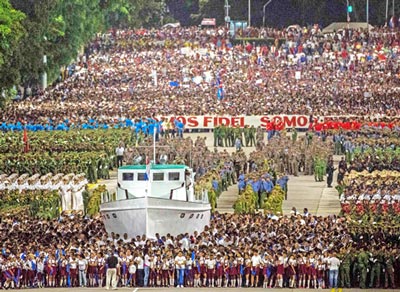
Vol. 81/No. 3 January 16, 2017
(front page)
Mass march in Cuba demands US end embargo, return Guantánamo

“What will take place this morning is only possible when there exists a united people,” Jennifer Bello, president of the Federation of University Students and a member of the Council of State, told the crowd, “the highest expression of a revolution that counts on workers, peasants, soldiers — dignified men and women who live proud of their society.”
The mass mobilization included both a military display and an outpouring of the population. It also marked the 60th anniversary of the landing of the Granma, which opened the revolutionary struggle that toppled the Washington-backed dictatorship of Fulgencio Batista in 1959. Several thousand Young Pioneers, primary school students, marched surrounding a replica of the boat, which brought Fidel Castro and other combatants from Mexico to Cuba.
“Cuba will not stop demanding the lifting of Washington’s blockade, which causes damage and privation for our people,” Bello said. “Nor will it stop demanding the return of the territory occupied by the U.S. Naval Base in Guantánamo, against the will of the Cuban people and government.”
Cuban President and Army General Raúl Castro presided over the mass mobilization.
“The people of Havana, representing all of Cuba, will fill the Plaza of the Revolution with their responsibility to continue to fight for our sovereign, independent, socialist, democratic, prosperous and sustainable nation,” Bello said.
The mobilization took places days after the conclusion of a session of the National Assembly of People’s Power where Raúl Castro spoke about the economic challenges facing Cuba. In the second half of 2016, decreases in oil supplies and other factors resulted in a 0.9 percent decline in the country’s gross domestic product, Castro said Dec. 27.
The capitalist crisis wracking Venezuela has led to significant reductions in crude oil shipped to Cuba at subsidized prices. Those shipments dropped from 90,000 barrels daily in recent years to 40,000 in the past few months.
Nonetheless, “free social services, such as education and public health for the entire population, were preserved,” Castro said.
We must not forget “the negative effects generated by the United States economic, commercial, financial blockade, which remain in effect,” Castro said. For example, Washington continues to prevent Cuba from conducting international transactions using the U.S. dollar.
The Cuban president projected modest growth in 2017, if the Cuban people increase productivity and limit waste.
“We must rid ourselves of unfounded fears of foreign capital,” Castro said. “We are not heading toward, nor will we head toward capitalism. This is totally ruled out.”
As Fidel Castro requested, the assembly adopted a law prohibiting the construction of monuments to the revolutionary leader or use of his name in designating streets or public squares.
Related articles:
Raúl Castro: ‘Make principles of revolution a reality every day’
Front page (for this issue) | Home | Text-version home